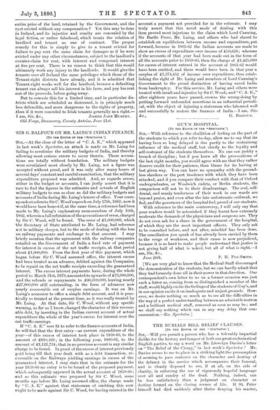'SIR G. BALFOITR ON MR. LAING'S INDIAN FINANCE. Pro THE
EDITOR OF THE "SPECTATOR."] 'SIR,—At the close of the letter of "C. A. E.," which appeared in last week's Spectator, an attack is made on Mr. Laing for 'failing to scrutinise the military budgets of India, and thereby allowing most serious errors to occur therein. These accusa- tions are totally without foundation. The military budgets were scrutinised most closely by Mr. Laing, not a figure was accepted without proof, and it was only after many hours of several days' constant and careful examination, that the military expenditure proposed was admitted. And, as regards errors, either in the budget or accounts, I can justly assert that it is rare to find the figures in the estimates and actuals of English military budgets to run so close as did the military budgets and -accounts of India during Mr. Laing's tenure of office. Your corre- spondent refers to Sir C. Wood's speech on July 17th, 1862; now it -would have been honest if, at the same time, a reference had been made to Mr. Laing's explanatory memorandum of July 10th, 1862, wherein a full refutation of the accusations of error, charged by Sir C. Wood, will be found. The error of 21,000,000, which the Secretary of State attributed to Mr. Laing, had reference not to military charges, but to the mode of dealing with the loss on railway payments and exchange to that amount. I may 'briefly mention that the agreement with the railway companies entailed on the Government of India a fixed rate of payment 'for interest in excess of the net traffic receipts, at that period about 21,000,000. From the first year of this payment, which 'began before Sir C. Wood assumed office, the interest excess had been treated as an advance, debited against the Companies, to be repaid on the net traffic receipts exceeding the guaranteed interest. The excess interest payments have, during the whole period to March 31st, 1879, amounted to upwards of 273,000,000, -and the refunds or repayments to 246,000,000, leaving nearly 227,000,000 still outstanding, in the form of advances now yearly recoverable out of surplus earnings. It VMS on Mr. Laing's accession to office a simple debt account, and it is prac- tically so treated at the present time, as it was really treated by Mr. Laing. At that date, Sir C. Wood, without any specific -warning, as far as I know, changed the character of this recover- able debt, by inserting in the Indian current account of actual expenditure the whole of the year's excess for interest over the met traffic earnings.
If "C. A. E." sees fit to refer to the finance accounts of India, ,he will find that the first entry—as current expenditure of the year—of this excess of interest took place in 1859-60, to the amount of £810,468; in the following year, 1860-61, to the amount of 21,121,734; that in no previous account is any similar -charge to be found. In proof of the excess of interest previously paid being till that year dealt with as a debt transaction, re- eovera.ble on the Railways yielding earnings in excess of the guaranteed interest, I may state that in the estimate for the year 1859-60 no entry is to be found of the proposed payment, -which subsequently appeared in the actual account of 1859.60; And as this estimate was prepared by Sir C. Wood, some months ago before Mr. Laing assumed office, the charge made by "C. A. E." against that statesman of omitting this sum ought to be made against Sir C. Wood, for having entered in the
account a payment not provided for in the estimate. I may truly assert that this novel mode of dealing with this item proved most injurious to the claim which Lord Canning, Sir Bartle Frere, Mr. Laing, and others who had slaved to establish an equilibrium between income and expenditure, put forward, because in 1861-62 the Indian accounts are made to show an excess of expenditure over income of £50,628; whereas if the accounts of that year had been made out in the form of all the accounts prior to 1859-60, then the charge of 21,425,080 for excess of interest entered in the account of 1861-62 would have been omitted, and there would have been in that year a surplus of £1,374,452 of income over expenditure, thus estab- lishing the right of Mr. Laing and members of Lord Canning's Government to the proud distinction of having saved India from bankruptcy. For this service, Mr. Laing and others were treated with insult and injustice by Sir C. Wood; and" C. A. E.," after eighteen years have passed, crowns the wrong-doing by putting forward unfounded assertions in an influential periodi- cal, with the object of injuring a statesman who laboured well and successfully to restore the finances of India.—I am, Sir.
G. BALFOUR.


































 Previous page
Previous page